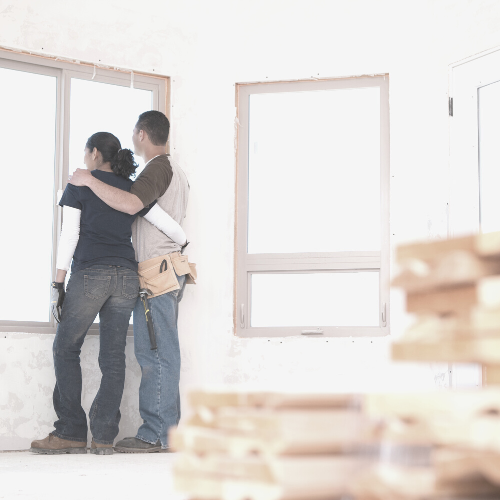Marriage is a beautiful celebration of love and commitment between two individuals. It marks the beginning of a new chapter in life, filled with joy, excitement, and a sense of togetherness.
One of the first things that newlyweds often think about is building their first home together. It is a significant step for many couples as it symbolizes their commitment and dedication to each other.
Recent statistics reveal that the median age for first-time marriages is around 30 for men and 28 for women. Many couples are getting married older, which is ideal for some because they likely have more means to afford a home at this age.
Modern newlyweds often look for a spacious home with a good layout and a desirable location. They may also be looking for an energy-efficient home with high-tech installations.
Building a home together marks the couple’s independence as they create their unique space. They consider it more than just a physical structure but also a sanctuary where they will build their new lives.
Creating a house celebrating your marriage sounds like an excellent idea, but it involves a lot of hard work and sacrifices. However, the problems you will face should not prevent you from enjoying this momentous journey together.

Common Struggles of Building Your First Home Together
Building a home for the first time can be a challenging experience for newlyweds. There are too many things to do within a short period. When the couple is not taking proactive measures and being open to each other, building a home can strain their relationship.
To avoid that situation, learn about the potential struggles you and your partner may face when constructing your first home.
Financing
Aside from having trouble affording the costs of home building, many newlyweds lack financial stability. They may not have a steady income or a long credit history, making it difficult to secure a favorable mortgage.
Finding the Right Place to Build Your Home
Finding the right place to build a home can be a headache for many newlyweds. The couple may have opposing preferences. For example, one partner may prefer a more urban environment, while the other wants a more rural setting.
Another reason is the limited availability of land in desirable locations. These locations are also often more expensive.
Zoning laws and building codes can also present a challenge. Certain areas may have strict regulations that prohibit certain types of construction or development.
Deciding the Home Design
It’s not uncommon for newlyweds to disagree on home designs due to their preferences. However, if both parties are adamant about building a house exactly how they imagined it, the conflict will occur. Be sure to make a compromise to reach an amicable conclusion.
It’s also possible that even if newlyweds do not clash with their home-building preferences, they can still struggle to decide because of the overwhelming number of options available. Since most newlyweds are not designing multiple houses at once, they should narrow their choices.
Others simply do not know what they want in a home. When the couple can not decide, the home-building process may confuse and frustrate all involved parties.

Dealing with Contractors and Vendors
Not every couple has familiarity with home construction standards and processes, so they may also have difficulty dealing with contractors and vendors. When not handled well, this situation can create misunderstandings, which can cause delays and increase costs.
The building process is inherently complex. Even if the couple had previous experience dealing with contractors and vendors, confusion can still happen. With many things to decide, couples may struggle to keep track of everything. Some contractors and vendors may not be as communicative as desired.
Due to the lack of coordination, the home-building process may experience delays and errors. Newlyweds should keep in touch and ask for regular updates.
Navigating Zoning and Building Regulations
Zoning and building regulations ensure new constructions are safe, functional, and consistent with the community’s goals and values. These regulations must be followed by anyone building a home.
However, not all newlyweds have the knowledge to navigate these regulations, which can vary greatly by location. Investing time and resources to understand the regulations is important, as non-compliance can result in fines, legal action, and penalties, causing unnecessary stress and anxiety for newlyweds.
Balancing Life Events While Building a Home
Building a new home can be a complex and time-consuming process for newlyweds, making it difficult to balance with other life events such as work, school, family obligations, and social activities. It requires a significant amount of time, energy, and attention, and can be emotionally and financially draining.
To avoid causing more complicated problems, couples should work together to manage potential issues and develop a system to manage their time and resources. This way, they can anticipate and address any challenges that may arise during the building process and minimize the potential strain on their marriage.

Top 10 Home Building Tips for Newly Weds
Building your first home as a newlywed can be a wild ride. If you’re confused about all the decisions you need to make, this article can provide valuable insights. The following paragraphs enumerate expert-proven tips that can make the home-building process a little less overwhelming.
1. Create a Detailed Budget and Stick to It
Creating a detailed budget helps newlyweds plan and manage building costs. Through it, newlyweds can prioritize their expenses and make informed decisions about where to allocate their resources. Sometimes unexpected expenses or changes can happen during the building process, so the couple should make specific adjustments and keep the overall costs under control.
Furthermore, having a budget allows newlyweds to secure financing for the construction of their homes. Lenders often require a detailed budget before approving loan applications. The newlyweds have a higher chance of securing a mortgage or other forms of financing and getting the best terms.
2. Determine Your Best Financing Options
Planning and managing construction costs is an important priority for newlyweds. Identifying the best financial options will help them make informed decisions and ensure they have the resources to complete the building process. Popular financial options for newlyweds building their first home include mortgages, construction loans, personal loans, and home equity loans.
Mortgages can be fixed rates or adjustable rates, and construction loans are short-term loans typically used to pay for materials and labor. Personal and home equity loans can also provide additional funds for the building process and can be a good option for those who do not qualify for a mortgage or a construction loan. Consult with a financial advisor or loan officer to determine the best financial options for your specific situation.
3. Find a Trustworthy Real Estate Agent
Finding a trustworthy real estate agent can be a game changer for newlyweds. They can provide insight and support to help make the best decisions for the new home.
First-rate real estate agents can identify a suitable land on which to build the house. They can also help negotiate the purchase price and guide the couple on zoning and building regulations. In addition, they can refer the couple to reputable builders and contractors.
Additionally, they can help manage the couple’s expectations, especially when dealing with unexpected challenges during the construction process, and advise them on navigating potential problems and applying practical solutions. It is advisable to research and interview several agents to find the best fit for their needs.
4. Partner with a Reputable Contractor
A contractor with experience in new construction can provide a detailed estimate of the costs associated with building a new home. They can also help identify potential issues with the house’s design and provide recommendations for cost-saving solutions.
The contractor can help the newlyweds understand the logistics of the building process, such as scheduling, permits, and inspections, and ensure that the house under construction meets all necessary building regulations.
However, finding a reputable and experienced contractor can be challenging. Newlyweds need to keep their options open and thoroughly research and interview potential contractors before finding one that meets their needs and expectations.
5. Communicate Openly and Frequently with Contractors
Open communication is essential for newlyweds during construction, as it allows them to discuss any concerns and work together to find solutions. It is especially important when dealing with unexpected challenges that may arise during the construction process, such as changes in the design or issues with materials or labor.
Open communication also helps newlyweds stay informed about the progress of the construction and make necessary changes. For example, budget or time constraints may occur, and good communication can help keep them on track and within their budget and time frame. Newlyweds need to establish open and regular communication with all parties involved in the construction process, such as the contractor, real estate agent, and financial advisor.
6. Make Room for Unexpected Costs
Making room for unexpected costs is a necessary countermeasure when building a new home. After all, it is a complex process that can come with many additional expenses.
Set aside a contingency fund. A contingency fund is a designated amount of money covering unexpected costs. It can include unexpected repairs, changes in the design or materials, and other unforeseen expenses.
Be flexible with the home design. Being open to changes and modifications in the design, such as simplifying the design, selecting more affordable materials, or downsizing the home, can help to keep costs under control.
Additionally, making room for unexpected costs also involves being realistic about the costs of building a home. Do proper research on the costs of materials and labor, as well as the costs of permits and inspections, and other additional costs.
7. Research the Materials and Fixtures You Will Use
Researching the materials and fixtures used during the home-building process is indispensable. Every part of your future home is crucial, so it is wise to invest time and effort in deciding what materials and fixtures will be used during construction.
Newlyweds should be aware of the quality and durability of the materials. It can help ensure that their homes are built to last and that they are getting the best value for their money.
Researching materials and fixtures also allow newlyweds to explore different options and find materials and fixtures that fit their budget. For instance, houses in rainy areas would require an underdeck zip-up drainage system. However, there are many options available in the market, so it can be confusing.

8. Keep Yourselves Motivated and Energized
Consistently finding ways to nourish themselves is essential for newlyweds as it helps ensure they have the energy and sustenance needed to manage the demands of building a new home.
Maintaining energy levels is important as building a new home can be physically demanding and requires a lot of manual labor. A healthy and balanced diet can provide the energy needed to get through the day.
Additionally, a proper diet can help alleviate stress and improve mental and emotional well-being during the often-stressful home-building process. It is important for newlyweds to make time and effort to prioritize their nutrition and well-being throughout the home-building process.
9. Have Open Discussions with Your partner for the Home Design
Having an open discussion about home design is essential for couples when building their first home, as it helps ensure that the final product meets their needs and expectations. Home design is a crucial aspect of building a new home, and it is important for couples to be on the same page when it comes to it.
One of the main reasons why couples should have an open discussion about home design is that it allows them to express their tastes and preferences. This can help ensure that the home reflects the personalities and lifestyles of both partners and that they are satisfied with the final product.
For example, if one partner prefers modern art, but the other wants to install timepieces, it would be best to find a compromise or alternative solution, like aesthetic custom canvas prints, that can accommodate both preferences.
10. Keep Detailed Records of All Expenses
One way to manage stress during the home-building process is to keep a detailed list of expenses. It allows couples to stay within their budget and avoid overspending, as well as track where their money is going, making it easier to make adjustments if needed.
Additionally, keeping a detailed list of expenses can help couples identify areas where they might be able to save money. For example, if they notice they are spending a lot on furniture, they might decide to shop for deals or look for ways to reuse or repurpose existing items.
Another important benefit of keeping a detailed list of expenses is that it can serve as a record for tax purposes. Many of the expenses associated with building a home, such as materials, labor, and mortgage interest, may be tax deductible. Having a detailed list of expenses can make it easier for couples to claim these deductions on their taxes, and it is advisable to consult with a tax professional for guidance on tax deductions.
Home Building Mistakes Newlyweds Should Avoid
Building a new home can be a joyous and exciting experience for newlyweds, but it is important to remember that it is also a complex and costly process. High emotions can lead to mistakes, so couples must stay levelheaded and set realistic expectations.
If you are a newlywed couple planning to build your first home, it is important to avoid common mistakes such as the following:
1. Buying a Property without Proper Inspection
It is a critical mistake for newlyweds to purchase a real estate property without proper inspection as it can lead to costly and unexpected repairs and potential health hazards down the road.
A licensed inspector can identify any issues with the property, such as structural problems, electrical or plumbing issues, or problems with the roof or foundation. If these issues are not addressed before purchasing the property, the newlyweds could be faced with significant expenses to fix them, which can put a strain on their finances.
Additionally, buying a property without proper inspection can also lead to potential health hazards such as mold, pests, or asbestos. These hazards can not only cause health problems, but they can also be costly to remove.
Furthermore, an inspection can also reveal any code violations or zoning issues, which could affect the property’s value and the ability to make any necessary repairs. Newlyweds need to invest in a thorough inspection by a licensed professional to avoid any potential issues and ensure they make an informed decision when purchasing a property.

2. Failing to Have a Clear Contract with the Contractor
A clear and comprehensive contract is essential for newlyweds when building their first home. It should include details such as the scope of work, materials to be used, cost estimates, payment schedule, and a timeline for completion. Having this information in writing can help prevent misunderstandings or disputes that may arise during construction.
A clear contract also protects the newlyweds’ financial interests. It should include a detailed breakdown of costs, including any contingencies for cost overruns, which allows them to have a good understanding of the final project cost and hold the contractor accountable for any mistakes or delays.
A clear contract can also protect the newlyweds from potential legal issues. For example, if the contractor does not have proper insurance, the newlyweds could be liable for any accidents or injuries that occur on the property.
A clear contract should include proof of insurance and any other necessary licenses or permits for the contractor. It is important for newlyweds to review the contract with a legal professional to ensure that it meets their needs and protects their interests.
3. Not Getting Multiple Quotes
Obtaining multiple quotes from different contractors can provide numerous benefits for newlyweds when building their first home. It allows them to compare costs and services and choose the best option that fits their budget and needs. It can also help them identify potential red flags, such as contractors who are significantly cheaper than others, which may indicate that they are cutting corners or using lower-quality materials.
Getting multiple quotes can also help newlyweds negotiate better prices and terms with their chosen contractor. It gives them leverage to negotiate more favorable terms, such as a longer warranty or a more detailed payment schedule.
Furthermore, it can give them an idea of the market rates for construction services and materials, which helps them identify if a contractor is overcharging or offering poor value. Newlyweds must obtain multiple quotes and thoroughly research and compare the contractors before deciding.
4. Failing to Research Zoning and Building Regulations
Zoning regulations dictate what types of buildings can be constructed in certain areas and ensure that the construction conforms to safety and aesthetic standards while building regulations ensure that the construction meets safety standards and building codes.
Newlyweds must research zoning and building regulations before beginning construction. Failure to do so could result in costly delays as they may have to make changes to the plans to comply with regulations. In extreme cases, it could lead to tearing down the entire construction.
Not understanding and following these regulations can also lead to fines, legal action, and other penalties. Newlyweds must understand and adhere to zoning and building regulations to avoid potential problems.
5. Not Having a Contingency Plan
Without a contingency plan, newlyweds may find themselves in a difficult financial situation if they encounter unexpected costs or delays. They may have to dip into their savings or take on additional debt to cover these costs, putting a strain on their finances. A contingency plan can also mitigate the impact of delays and offer alternative solutions.

6. Failing to Manage Stress and Maintain Emotional Well-Being
Finding a property, getting financing, and managing the construction process can be overwhelming. It can take a toll on their emotional well-being.
If newlyweds do not manage their stress effectively, they may become irritable, anxious, or depressed, leading to conflicts and misunderstandings. These conflicts can further exacerbate their stress and negatively impact their relationship.
The stress and emotional strain of building a home can also lead to neglecting other aspects of their relationship, such as communication, intimacy, and quality time together. It can significantly strain the marriage and potentially lead to long-term problems.
Home Building Takes Ample Time and Preparation
Building a home is an exciting step for newlyweds, but it takes time and preparation. Each step can take several months, from finding the right property to securing financing, planning, and overseeing construction.
Newlyweds need to be realistic about the timeline and be prepared financially, mentally, emotionally, and physically for the challenges. Building a home should be a joyous experience that strengthens the couple’s love and trust for each other. Make sure to be well-prepared before starting the process.
Home-building is an exciting yet challenging task for newlyweds. To make the process smooth, it’s important to research options and communicates effectively. This guide can help newlyweds be more meticulous and understand that every detail matters. Constant communication is key to addressing problems and finding the best solutions.

Jeff Oxford is a writer and a Community Relations Officer with a passion for home renovation. In his spare time, he enjoys putting his DIY skills to the test as he works on renovating his own home. With a keen eye for detail and a love for creating functional, beautiful spaces, Jeff loves to share his projects with his readers and really show both ups and downs, Whether he’s tackling a major remodeling project or simply sprucing up a room with a fresh coat of paint, Jeff approaches each challenge with enthusiasm and determination.


